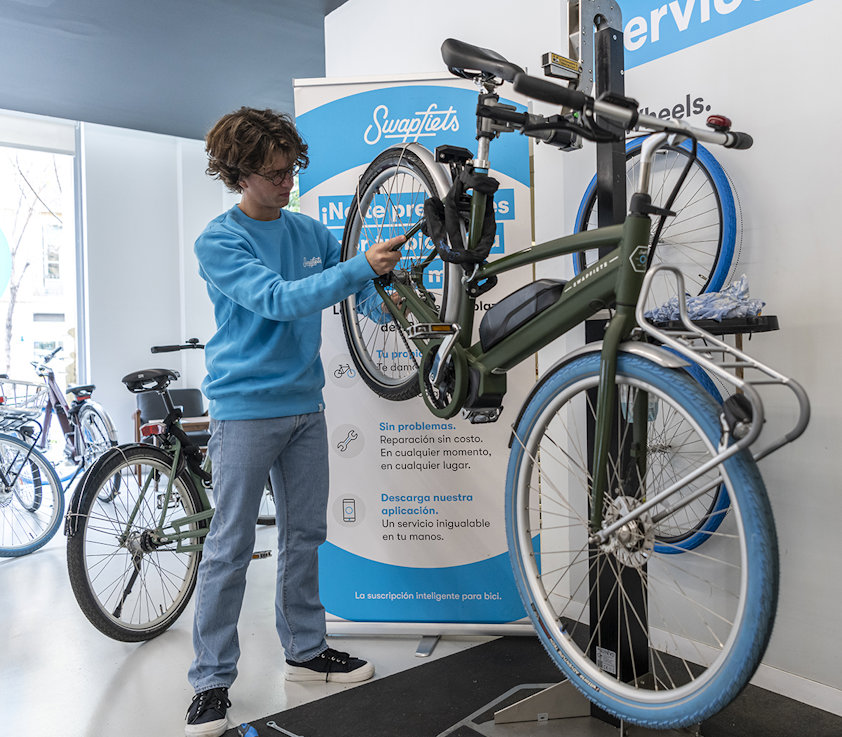The circular partnership of Swapfiets and Hydro
Swapfiets is a bike service company founded on the principles of circularity, which made selecting Hydro as a partner a relatively easy task.
The business concept of Swapfiets is a subscription model: Its customers pay a monthly fee in exchange for a fully functional classic bicycle or an electric bike for their personal use. It is a service. And if needed, a repair service at the customer’s location will either fix or swap the bike within 48 hours. This is included in the membership fee.
Hydro has taken on a unique role in the partnership with Swapfiets, utilizing its experience in working with recycled aluminium. They are working together to further develop the concepts of circularity and use of recycled aluminium.
“Swapfiets wants to know where the material used in their bikes ends up. With them and one of our recycling partners, we are creating a closed loop – taking back their end-of-life products – which is a unique collaboration for us,” says Yon van den Oever, who manages the close-the-loop project for Hydro Extrusions in the Benelux region.
“Our next step,” he says, “is to integrate the aluminium we recycle for them into extruded solutions for their new bikes.”

A circular business concept for bicycles
In that respect, Swapfiets is the perfect partnership for Hydro. They share common interests and the Dutch company has a business that is booming.
Since 2014, when three students at the Delft University of Technology established the company, Swapfiets has grown to have more than 270,000 paying members. These members reside in some of the largest cities in Europe, including Amsterdam, Berlin, Copenhagen, London, Milan and Paris.
The members are easy to spot, too. They are the ones riding bikes with the front tires colored “Delft Blue.”
Environmental and commercial benefits hand-in-hand
In 2022, Swapfiets became certified as a B Corporation. These are businesses that meet the highest standards of verified social and environmental performance, public transparency, and legal accountability to balance profit and purpose.
In the same year, the company committed to building a 100 percent circular bike and to becoming climate neutral, both by 2025.
“Now we are in a phase where we are developing new parts and processes in the bike industry, so we can achieve both environmental and commercial benefits – and change the industry,” says Richard Burger, director of sustainability and one of the co-founders of Swapfiets.
“It isn’t a question of whether the circular economy is going to happen, but when. And at that point, it will be tougher for the companies who are not aligned with circularity to comply with the new regulations that are coming. The time is now,” he continues.
Aligning on a common goal
In addition to Hydro, the Swapfiets collaboration includes HKS, the largest metals recycler in the Netherlands, which handles metal collection, transport, shredding and sorting. Other bike brands have been in contact to express their interest in working together on this kind of collaboration.
“Our primary circular focus is on lifetime extension and repairability. Recycling is the last step, and since bicycles generally use a high-value aluminium alloy, it pays off to recycle this closed-loop,” says Burger. “Aluminium is the best metal for the bike frame because it does not rust like steel. We generate very little aluminium waste – our bikes are still going strong.”
Van den Oever fully agrees.
“The amount of aluminium we are receiving from the Swapfiets bikes at end-of-life represent small volumes, but the work matches perfectly with our sustainability core values. And it gives us experience in closing the loop,” he says, adding that Hydro intends to extrude low-carbon aluminium parts for the circular bike that Swapfiets is targeting.







